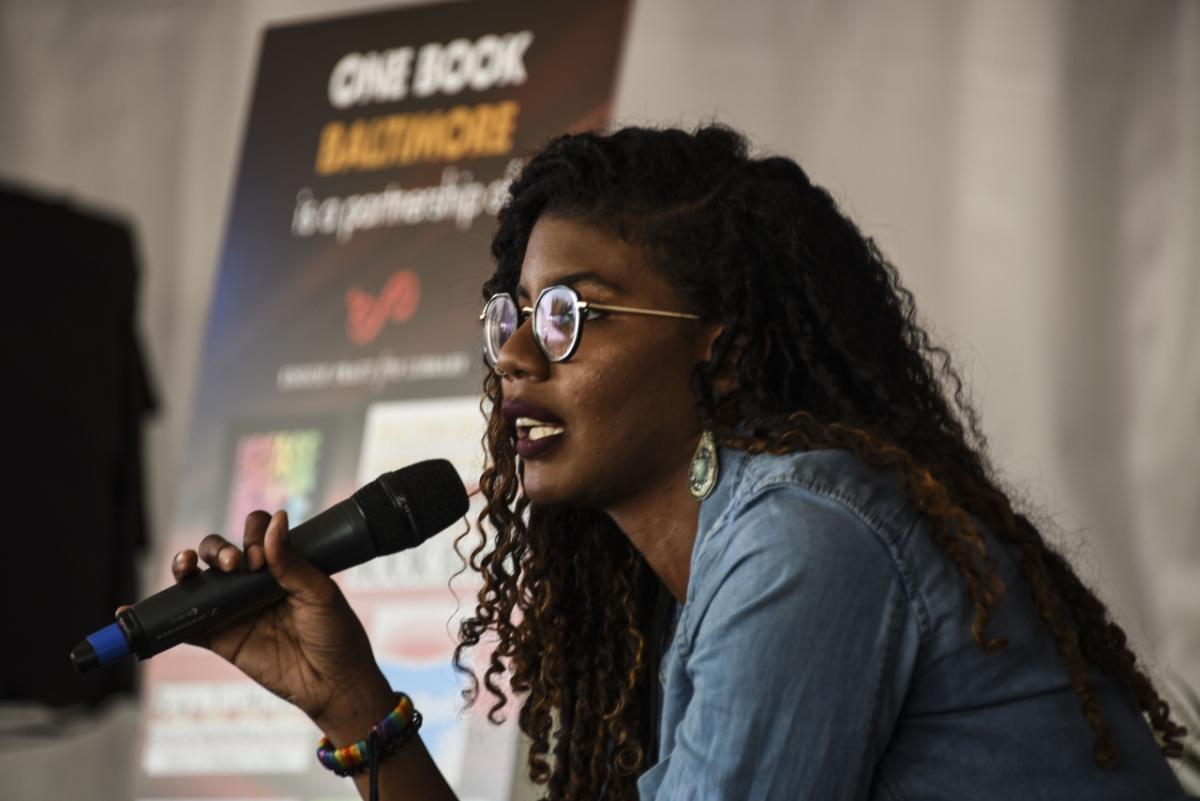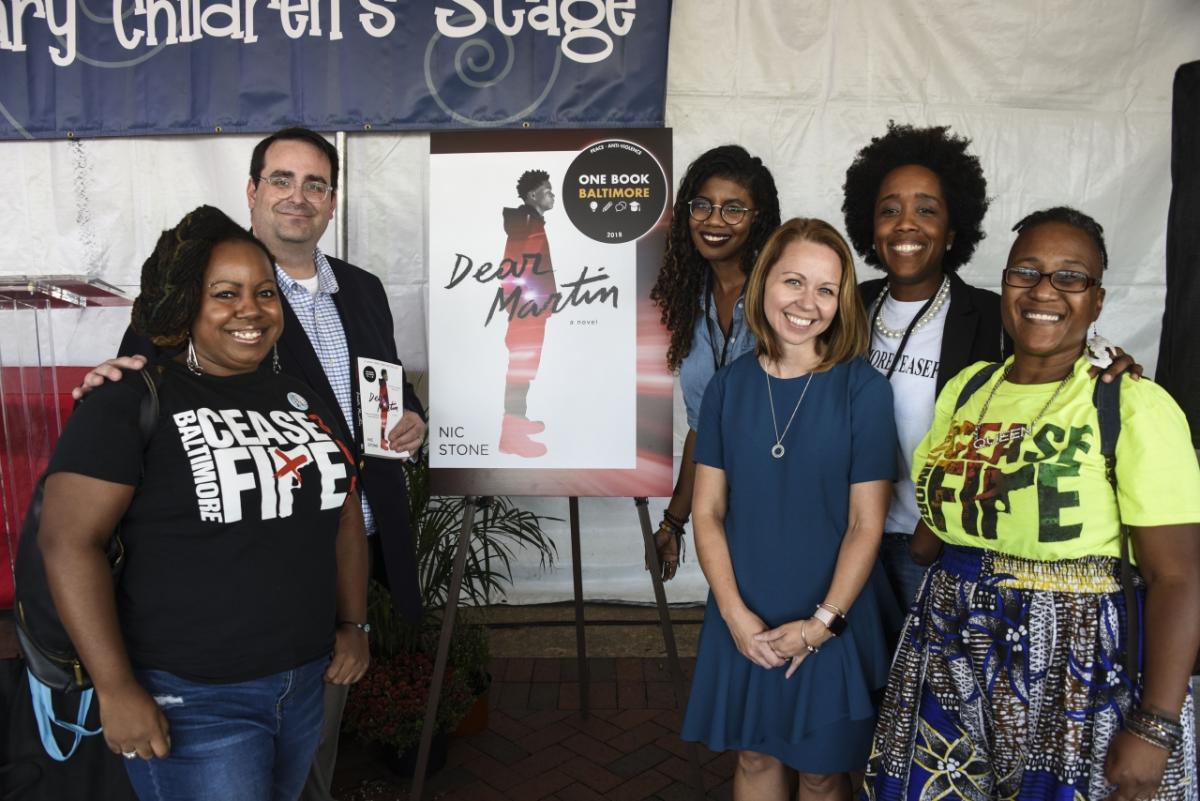What Can Tween Literature Teach Us About Peace and Racial Equity?
In the opening of Dear Martin by Nic Stone, the book selected for One Book Baltimore, 17-year-old honor student Justyce McAllister is racially profiled by a police officer, who mistakenly thinks he was trying to steal a car, when he actually was trying to prevent his girlfriend—who had been drinking—from getting behind the wheel.
“Jus swallows, head spinning, unable to get his bearings. The sting of cold metal around his wrists pulls him back to reality.
Handcuffs.
It hits him: Melo’s drunk beyond belief in the backseat of a car she fully intended to drive, yet Jus is the one in handcuffs.
The cop shoves him to the ground beside the police cruiser as he asks if Justyce understands his rights.”
To help make sense of his experience, Justyce begins writing a journal addressed to Martin Luther King, Jr. He asks himself, “What would Martin do?” as he aspires to find peaceful solutions to the challenges that he and his friends face. Although racial tensions rise and violence escalates as the story unfolds, Justyce’s journaling helps him process difficult situations and formulate his responses.
The events described in the book may sound familiar to young people in cities and suburbs across the U.S. That’s why it was the book choice for One Book Baltimore, a collaboration between the T. Rowe Price Foundation and more than 10 Baltimore organizations, focused on promoting city-wide conversations about peace and anti-violence among Baltimore students, families, and community members. Free copies of the book were given to all Baltimore City Public School seventh and eighth grade students, and partner organizations have created numerous in- and out-of-school opportunities for students and community members to discuss the book.
Promoting Peace
The idea for One Book Baltimore emerged from conversations among several local leaders in the wake of the social unrest in Baltimore that followed the death of Freddie Gray. “We saw that other cities had used family literacy efforts to bring communities together and foster meaningful conversation,” says John Brothers, president of the T. Rowe Price Foundation.
From John’s early conversations with other local leaders, it was clear that themes of peace and anti-violence had to be central to the initiative.
Baltimore Ceasefire 365, a local community-led organization whose goal is to bring the murder rate in Baltimore to zero, played a key role both in the planning process and in leading community discussions. As organizers skilled in mediation and in working with people of all ages, Letrice Gant and Erricka Bridgeford trained others to lead community conversations about the book and help guide the initiative in a direction that would resonate with students, parents, and other community members.
Sonja Santelises, CEO of Baltimore City Schools, underscored in a recent interview with WBAL-TV, “Providing books that kids can relate to, where the literature speaks to them, is a really important key to getting kids to read.”
Peace and anti-violence were themes that the book selection committee looked for during the selection process. The committee included teachers, librarians, and parents and sought student input via surveys before narrowing a long list of possible titles down to a “Top Five” based primarily on how strongly each book dealt with these core themes.
By choosing a gritty narrative that explicitly deals with peace, anti-violence, and racial equity, One Book Baltimore’s collaborators hope that individuals will engage in meaningful open dialogue about their experiences and the challenges facing our communities, and that they may ultimately see a new path for themselves.
Regarding her book being a part of the initiative, author Nic Stone says, “To know that children—and adults—across the city of Baltimore will be reading and engaging with Dear Martin is an honor beyond measure. It is my deepest hope that slipping into Justyce’s shoes will open eyes and minds in a way that will move the world we inhabit a bit closer to that of Dr. King’s Dream.”
Letting Student Voices Lead
One Book Baltimore kicked off at the Baltimore Book Festival on September 30, where author Nic Stone spoke.
"There was an amazing turnout of students who came to see Nic speak,” says Jennifer McCord, a fellow with the T. Rowe Price Foundation. “Their energy and enthusiasm for the book were palpable—they were brimming with questions for Nic and eager to engage.”
Special programs tied to the book took place throughout the fall in Baltimore City Public School classrooms and at Enoch Pratt Free Library branches. One Book Baltimore activities were held at every Pratt Library location over the course of the recent Baltimore Ceasefire weekend, November 2–4.
Melanie Masek, a T. Rowe Price associate who volunteered at the Pratt’s Orleans branch over Ceasefire weekend, says of her experience, “As someone who lives in Baltimore, it felt good to volunteer in a way that was helpful to my community and to students.”
Many of these events were discussions led by the Pratt’s Community Youth Corps, students selected to participate in the library’s Teen Development program. This year’s Community Youth Corps members were trained by Baltimore Ceasefire 365 leaders to lead and mediate community discussions about Dear Martin.
“Just as the characters in Dear Martin sought to open and engage in a dialogue about difficult topics related to race and peace, our hope is that by encouraging community members to read this book, we can bring that conversation into the Baltimore community and ultimately learn from one another,” says John Brothers.



